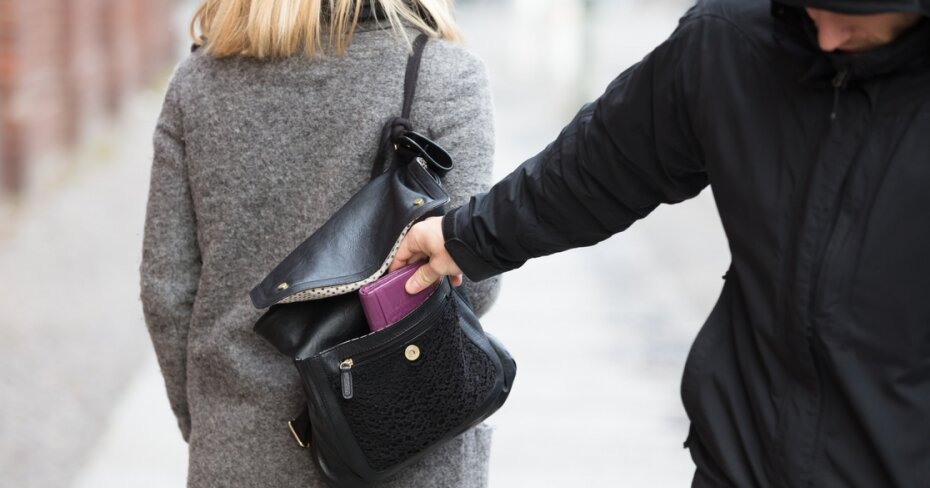I’ve been mugged while travelling overseas. Now what?

A pickpocketer can lift your wallet in a matter of seconds, no matter how vigilant you are, and it can leave you in a tough spot in a foreign country. Here’s what to do if you’re mugged while travelling abroad.
It was a chilly day in March 2013 when I landed in Brussels, Belgium. I’d flown to the capital city from Denmark, where I’d been studying on exchange for the last two months, to report from the European Commission (the executive branch of the European Union) for a class assignment. It would be a week-long trip spent alongside my fellow classmates and teacher. I would get to meet the Danish commissioner for climate action, and have the chance to sit in on several important committee hearings — and write all about it. It was going to be a big week.
As my classmates and I made our way to the subway platform to catch the train to our hotel, four men rushed past me on the stairs. “Excusez-moi s’il vous plaît, s’il vous plaît!” they said, appearing to be in quite a hurry. I moved to the right and let them pass by. When I reached the platform, I turned around and saw the same four men heading back up the stairs in the opposite direction of the one they’d seemed in such a rush to travel in. Hmph, I thought. That’s weird.
A few minutes later, we arrived at the lobby of our hotel. The concierge asked for some identification so we could check in to our rooms. I reached into my coat pocket for my wallet. But my wallet wasn’t there.
The moment you realize you’ve been pickpocketed in a foreign country, your brain starts to operate on a bit of a loop. You begin mentally retracing your steps at an accelerated clip until you arrive at the mistake you made or the unusual encounter that got you here. For me, it was the naive decision to drop my wallet into my very deep, and very open, coat pocket just before I headed down the subway steps. Clearly those men had been watching me, and what they saw was an easy target.
Being mugged while travelling overseas can happen to anyone. In 2018 alone, Canada’s consular officers opened cases for more than 10,000 passports that were reported lost or stolen abroad. If it happens to you, it’s important to be proactive and take the necessary steps to mitigate the situation as much as possible.
1. Cancel your credit and debit cards
The first thing you should do if your wallet’s been stolen is cancel any of the credit or debit cards that you had inside of it.
That will mean calling the international number of your credit card companies and calling your bank and letting them know what’s happened, so they can put a stop to any fraudulent activity hopefully before it happens.
“Credit card companies will act right away,” says Natalie Preddie, a Toronto-based travel writer and expert.
To make this information easily accessible, keep copies of all your cards, relevant phone numbers, and your passport. “Then you can go to the hotel and say this is the number for my credit card company and they will let you use their phone,” says Preddie.
“Credit card companies can also advise you on what to do should you need more spending money.”
2. File a police report
Once you’ve done that, you need to document that the crime even happened. That will mean heading to the nearest police station and filing a report. Depending on what country you’re travelling in, this could be challenging, especially if you don’t speak the local language.
The government suggests that if you can’t get to the police right away, then “write down all the details you can remember about the crime. If possible, have photographs taken of visible injuries.”
But as soon as you can, try and relay the information to law enforcement.
“The police can keep an eye out,” says Preddie. “It could be nothing but something could show up and you never know, so it’s always good to let them know.”
Police might suggest searching nearby trash bins, since pickpocketers are often just after quick cash and will discard the wallet and the rest of its contents as soon as they get some.
If your passport was also stolen, “The local police will be able to get you to the Canadian embassy and will help you figure out what to do to get you back to Canada,” says Preddie.
3. Notify the local embassy or consulate
On its website, the Government of Canada has a list of all the Canadian embassies and consulates and their locations in various countries around the world. Have a look at where the local embassy is located in the country you’re in. (It’s probably a good idea to do this before you travel, too.)
Even if your passport wasn’t stolen, Preddie says it’s still a good idea to reach out to the embassy or consulate to let them know you’ve been the victim of theft.
Why?
“Let’s say your wallet had your drivers licence in it and other identification,” she says. “It’s a good idea to let the consulate know in case anything surfaces with your name anywhere else, then people will probably be aware right away that it’s not you.”
4. Call your travel insurance company
Assuming you purchased travel insurance before your trip, once you’ve taken all the steps above, reach out to your insurance company and start a claim as soon as possible.
“This is exactly why you have travel insurance,” says Preddie, who adds that being mugged would fall under baggage loss.
“They will require a copy of the incident report from the police,” says Preddie. “So whatever steps you take — the consulate, the bank, the police — have proof of it. Then you have all of this documentation to say I did everything in my power to rectify the situation.”
And, says Preddie, your travel insurance company should have a partner in the country that you’re travelling in. So they can direct you on where to go for additional help.
Not only will they open a claim, they might also be able to issue you travelers cheques if you don’t happen to have any other cash on you. “They’re very fast at making sure you are not stuck or stranded,” says Preddie. Once you get back home, you might need to fill out additional forms to help support the claim.
5. Get your hands on some cash
While all of this is happening, you should also try and access some cash, especially if you’re going to be travelling for several more days.
“And because one is such a good planner, you will have kept some additional cash back in your hotel safe,” says Preddie.
But if you weren’t a good planner, then you might need to ask friends and family (either with you or back home) to lend or wire you money.
When I was mugged, my classmates were kind enough to lend me some cash until I was able to pay them back, and my parents transferred me money via Western Union. When Preddie was mugged in London, England, her parents were able to wire her money that she could access from a nearby bank. This might be challenging if much of your identification was also stolen, which is why it’s crucial not to put everything in one place when you travel — and to create copies of everything that’s in your wallet and keep them separate from your person, like in a hotel safe.
“Make copies of your cards so if everything’s gone, you can prove who you are. Because that’s going to be the hardest part,” says Preddie.
“But ultimately,” she says, “do not panic. This does happen. You won’t get stuck. It’s a pain, but it happens enough that all of these offices are ready to be able to assist you.”
About the author

Lisa is a senior editor in the personal finance space. Her work has appeared in Reader’s Digest, Toronto Life, Canadian Living and TVO. As a child, she diligently hoarded the $50 bills that fell out of her Christmas cards. Adult Lisa is working hard to resurrect those stockpiling tendencies.


